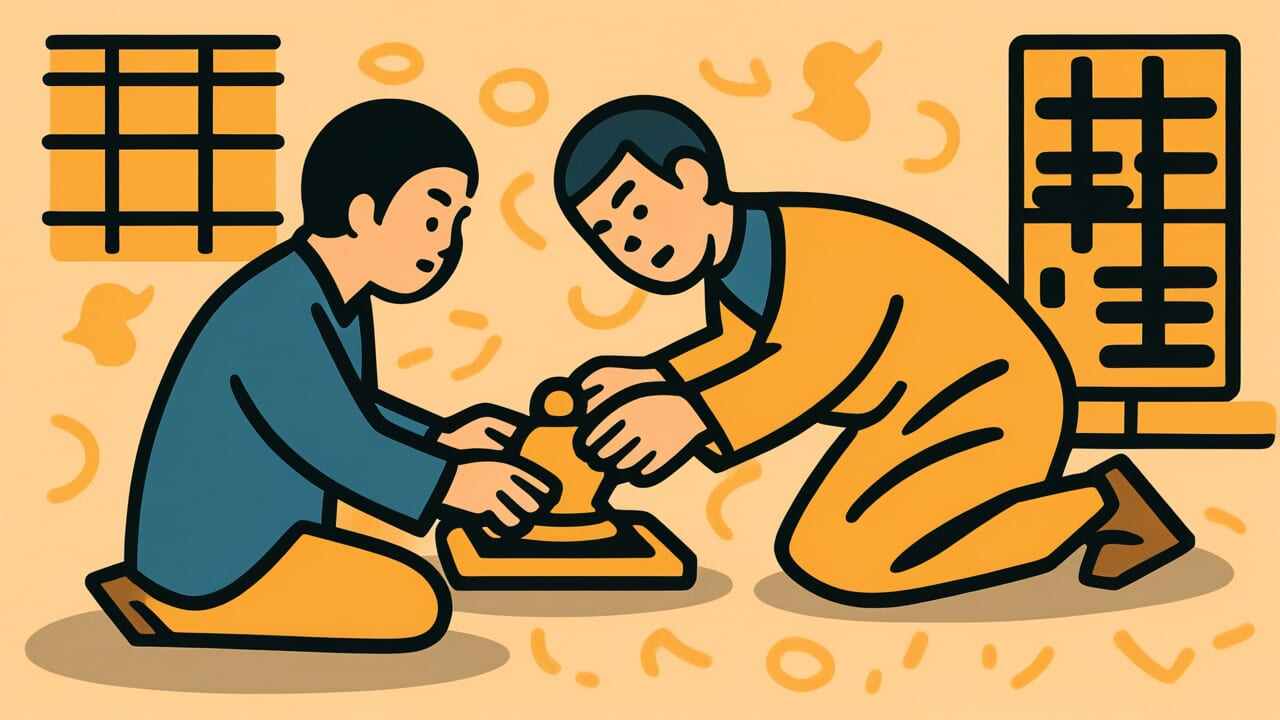How to Read “Those who win at Go lose at shogi”
go-de-katsu-mono-wa-shogi-de-makeru
Meaning of “Those who win at Go lose at shogi”
This proverb means that even people who excel in one area may not succeed in another. Everyone has strengths and weaknesses. Success in one field doesn’t guarantee success in all others.
This saying is used to warn people who become overconfident after succeeding in their specialty. They might think they’ll succeed just as easily in unfamiliar areas. It’s also used to comfort someone who has failed in one area, suggesting they have other talents waiting to be discovered.
In modern times, this wisdom has become even more important. We live in a society that values specialization. This proverb reminds us that no one is good at everything. It teaches us to accept this reality and honestly assess our own strengths and weaknesses.
Origin and Etymology
The exact origin of this proverb isn’t clearly documented. However, we can understand how it came to be by looking at the contrast between Go and shogi.
Go and shogi are both traditional Japanese intellectual games, but they’re very different. Go is about controlling territory on the board. It requires a broad perspective and strong spatial awareness. Shogi is about capturing pieces and cornering the opponent’s king. It demands deep tactical thinking and strong combat skills in specific situations.
This proverb likely emerged from observing these differences. Someone strong at Go might have excellent strategic vision. But the detailed reading and tactical thinking needed for shogi are separate abilities. The saying expresses how human talents are naturally uneven across different fields.
During the Edo period, both Go and shogi were widely enjoyed by common people. Many played both games. The proverb probably arose naturally from people’s actual experiences with these games.
Usage Examples
- He’s the top salesperson, but he’s not good at writing proposals. Those who win at Go lose at shogi, so we should just let everyone use their strengths
- I was great at programming, but management isn’t going well at all. Those who win at Go lose at shogi—this is exactly what that means
Universal Wisdom
This proverb quietly but firmly teaches us that human abilities are always uneven. Sometimes we get drunk on one success and mistakenly believe we’re excellent at everything. But reality isn’t that kind.
Why was this proverb created and passed down through generations? It expresses the eternal conflict between our “desire to be good at everything” and “the limits of reality.” Everyone wants to excel in all areas. But time and talent are limited. When you become great at something, something else inevitably gets neglected.
This saying contains another deep insight. It teaches the importance of accepting failure and defeat with grace. Just because you lost in one place doesn’t mean you’ve lost your value. You might win somewhere else. This perspective helps people recover from failure and face new challenges.
Our ancestors understood that no one is perfect. That’s why they developed the wisdom to respect each other’s strengths and support each other’s weaknesses. This proverb contains a philosophy that recognizes human diversity and forms the foundation of a society where we live together.
When AI Hears This
The brain has something called “use-dependent plasticity.” Neural circuits that get used more become thicker and stronger. But the brain consumes about 20 percent of the body’s total energy. It can’t strengthen all circuits at once. The brain constantly chooses which circuits to invest in.
Go and shogi use surprisingly different brain regions. Go relies heavily on right-brain spatial recognition to see the whole board and sense where it’s “thick” or “thin.” Shogi uses more left-brain logical thinking to calculate the sequence of moves needed to capture the king while considering piece hierarchies. Brain imaging studies confirm that professional Go players and shogi players activate different areas.
Here’s what matters: the brain’s reward system releases dopamine in response to success, which further strengthens those circuits. When you keep winning at Go, rewards concentrate on spatial recognition circuits. Myelination, which speeds up neural transmission, also progresses preferentially there. Meanwhile, logical reading circuits remain relatively weak.
The reward of “winning” becomes a powerful command to the brain: “strengthen only this circuit.” This isn’t just about time allocation. It’s a physical structural change happening in the brain itself.
Lessons for Today
This proverb teaches you the value of knowing your limits. That doesn’t mean giving up. Rather, it’s a strategy for concentrating on your strengths and achieving maximum results.
Modern society seems to demand “supermen” who excel at everything. But everyone actually has strengths and weaknesses. What matters is finding where you can truly shine and putting all your energy there. You and everyone around you will be happier when you produce outstanding results in your strong areas rather than struggling in weak ones.
At the same time, this proverb teaches tolerance toward others. Just because someone failed in one situation doesn’t mean you should reject everything about them. They might show brilliant abilities in different situations. In teams and organizations, combining everyone’s strengths creates achievements no individual could accomplish alone. Your weaknesses can be covered by someone else’s strengths.



Comments